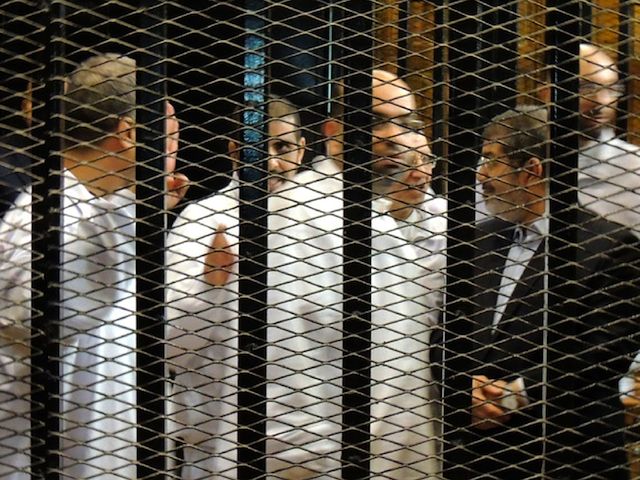SUMMARY
This is AI generated summarization, which may have errors. For context, always refer to the full article.

CAIRO, Egypt – Egypt’s deposed president Mohamed Morsi appeared in court Monday, November 4, on the first day of his trial for incitement to murder, rejecting its legitimacy and demanding that “coup” leaders be prosecuted.
In his first public appearance since the military toppled him in July, Morsi was indignant and outraged in the makeshift courtroom at a police academy in east Cairo, where his trial was adjourned until January 8.
“I am Dr Mohamed Morsi, the president of the republic,” the defiant Islamist told the court.
In the nearly three-hour hearing the judge heard requests from the defendants’ lawyers, who demanded to see all the case files and be allowed to meet their clients privately.
Morsi, held at a secret location since July 3, was then flown to Borg al-Arab prison outside Egypt’s second city, Alexandria.
He and 14 co-defendants are accused of inciting violence and the murder of protesters outside the presidential palace in December, charges that could lead to the death penalty or life in prison.
The Islamist leader branded as criminal his overthrow after mass protests against his single year of turbulent rule.
“This was a military coup. The leaders of the coup should be tried. A coup is treason and a crime.”
“I cannot accept for the judiciary to become a cover for the military coup,” he yelled. “I am here involuntarily, and through force.”
Morsi, wearing a dark blue suit, was brought by helicopter and then driven to the heavily fortified police academy.
State television showed Morsi smiling as he stepped out of a white van, buttoning his blue blazer and entering the dock to applause from fellow defendants in white prison uniforms.
Muslim Brotherhood co-defendants Essam al-Erian and Mohammed al-Beltagui chanted “Down with military rule” at the hearing, as Morsi, his greying beard closely trimmed, smiled and waved at supporters packing the courtroom.
Judge Ahmed Sabry Youssef banned cameras and recording equipment.
Morsi’s supporters, battered by a bloody and sweeping police crackdown, accuse the army-installed government of fabricating the charges against him.
They staged anti-military rallies across Cairo, including outside the police academy where dozens brandished posters of Morsi and signs bearing anti-military messages.
Thousands also protested outside the constitutional court and some rallies were held in Alexandria.
“Morsi’s trial is a farce. The criminals are trying the legitimate president,” one supporter, Ibrahim Abdel Samd, said.
Security forces sealed off Nahda Square – site of a bloody crackdown on Morsi supporters in August – and Cairo University, as military vehicles guarded police stations.
The authorities deployed 20,000 policemen for the trial, and warned they would deal with any violence. At least 53 pro-Morsi protesters were arrested, security officials said.
‘Defiance noteworthy’
Morsi’s trial is seen as a test for the new authorities, who have been accused of heavy-handedness.
With more than 1,000 people killed since Morsi’s overthrow and thousands of Islamists arrested, hopes for a political settlement are slim.
“Morsi’s insistence that he is still the legitimate president shows that he and most of the Muslim Brotherhood is not ready to give up their legitimacy claim,” said Shadi Hamid of the Brookings Doha Center think-tank.
“Their stand is detached from the reality, but their defiance is noteworthy and could keep supporters energized.”
The Anti-Coup Alliance backing Morsi said his defiance was a message to continue “non-violent opposition against the repression and tyranny until the coup is completely defeated,” and called for protests on Tuesday.
Despite calls to demonstrate on Monday, his supporters failed to mobilize in large numbers.
Amnesty International said Morsi should be granted a fair trial, including the right to challenge evidence against him.
“Failing to do so would further call into question the motives behind his trial,” said Amnesty’s Hassiba Hadj Sahraoui.
But Hamid believes the “political” nature of the trial will drive its outcome.
“There is zero chance of it being free and fair,” he said.
On Sunday, November 3, foreign ministry spokesman Badr Abdelatty said Morsi “will have rights to a free and fair trial”.
Morsi was catapulted from the long-banned Muslim Brotherhood to the presidency after winning Egypt’s first free elections in 2012.
His victory was made possible by the 2011 uprising that toppled long-time autocrat Hosni Mubarak.
But Morsi’s short-lived presidency was marred by political turmoil, deadly clashes and a crippling economic crisis.
In November 2012, he decreed himself sweeping powers, prompting opponents to accuse him of failing the ideals of the revolution.
It was a turning point that launched the worst polarization in Egypt’s recent history.
A month later, deadly clashes erupted outside the presidential palace between his supporters and opponents in which at least seven people were killed. – Rappler.com
Add a comment
How does this make you feel?
There are no comments yet. Add your comment to start the conversation.